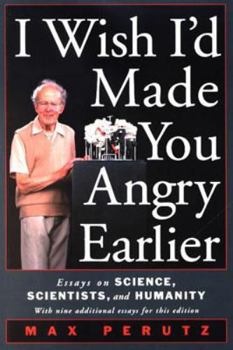I Wish I'd Made You Angry Earlier: Essays on Science, Scientists, and Humanity
Select Format
Select Condition 
Book Overview
Science is no quiet life. Imagination, creativity, ambition, and conflict are as vital and abundant in science as in artistic endeavors. In this collection of essays, the Nobel Prize winning protein chemist Max Perutz writes about the pursuit of scientific knowledge, which he sees as an enterprise providing not just new facts but cause for reflection and revelation, as in a poem or painting. Max Perutz's essays explore a remarkable range of scientific...
Format:Paperback
Language:English
ISBN:0879696745
ISBN13:9780879696740
Release Date:December 2002
Publisher:Cold Spring Harbor Laboratory Press
Length:460 Pages
Weight:0.55 lbs.
Dimensions:1.1" x 6.0" x 9.0"
Customer Reviews
1 rating
Charming prose, plenty of surprises
Published by Thriftbooks.com User , 24 years ago
Perutz is not only a biochemist and a Nobel Laureate physicist, but a witty and graceful writer to boot, and readers will be in for a treat. But more than the character sketches of great scientific minds like Szilard and Monod, I appreciated two startling stories in particular, one of which is told in more fascinating detail than I'd encountered before, and the other, which is shocking and, if true, deserving of wider publicity. The first story details the work of Nobel prize-winning chemist Fritz Haber, whose synthesis of ammonia enabled Germany to sustain its military effort in WWI. Haber, a gentle man of tremendous culture and erudition, was also ambitious. Perutz describes in more detail than is readily available elsewhere Haber's efforts to sustain chemical warfare experiments after the war under the guise of agricultural research. Tragically, he supervised the development of Zyklon B, a deadly gas that would later be used to exterminate millions of people of Jewish descent, including some of Haber's own relatives. Fortunately for him, Haber died in exile before learning the full extent, and horror, of his folly. More startling to me was the story of Albert Schatz who, Perutz contends, is the real discoverer of streptomycin. Schatz, writes Perutz, "was the son of poor Jewish farmers in Connecticut and had studied soil microbiology to find ways of increasing the yields on his father's unproductive farm. He embarked on the search for antibiotics only because Waksman made it a condition of his meager offer of $40 a month to work in his laboratory; but then Schatz threw himself into the research, testing hundreds of different soil micro-organisms for antibacterial activity." Perutz claims that Schatz displayed all the initiative and effort warranted for a Nobel Prize, and that Waksman did nothing more than sit in his office while the experiments were going on. Later, claims Perutz, Waksman denied Schatz the recognition he so richly deserved. Unless I missed something, I wonder why Perutz is telling us this only now? Wouldn't it have been better for this information to have been revealed when Waksman was alive to defend himself? And can we expect forthcoming reference books to take note and set the record straight?





